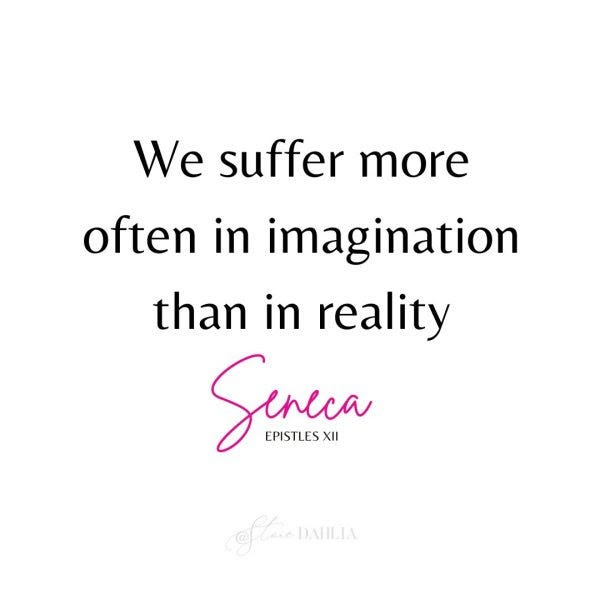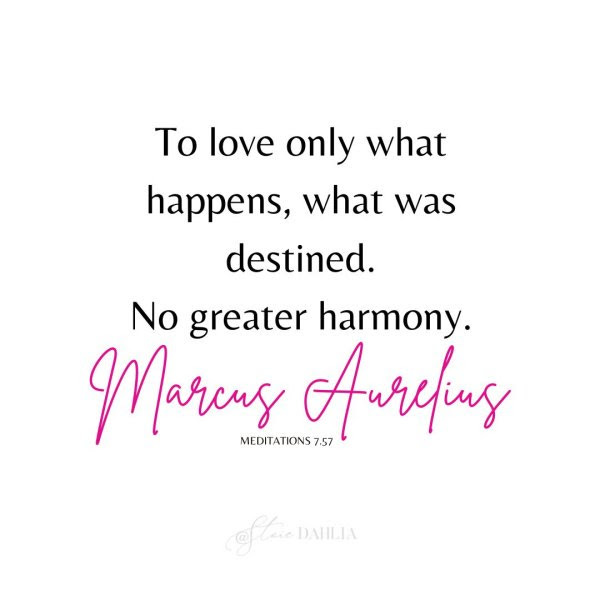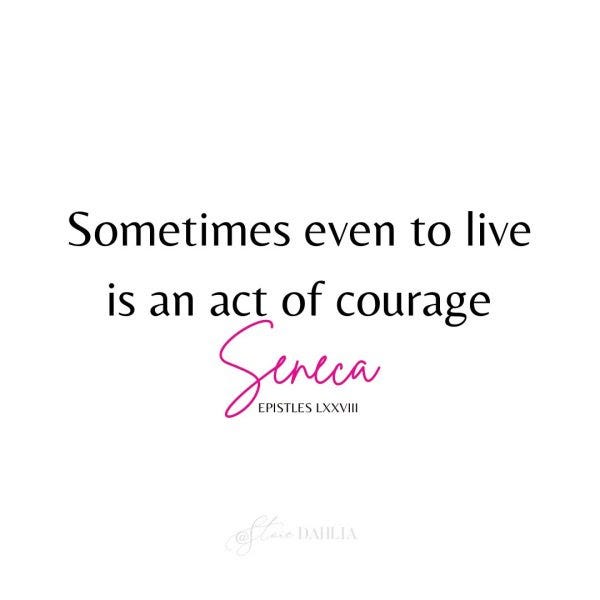The Hard & The Beautiful: Flourishing Through Stoicism
This February, we’ve redefined self-love—Stoic Style. Now, let’s put it all together.
Short on time or too long don't want to read? Why not listen to this email instead? Listen Here for Wisdom on the Go!
Hello there courageous heart,
Ya know…if I were to name my life as a soap opera show it would totally be called “The Hard and The Beautiful”!
Well, here we are at the end of February.
I hope this message finds you more empowered than when we began our journey through February’s Self-Love series. This will be the last installment.
This week, I’m writing to you from a magical place on earth.
Where the mountains stretch endlessly, the air is crisp, and nature moves in its own rhythm—completely unbothered by human expectations.
It is also a place where I’ve felt both helplessness and hope.
Here I’ve experienced the exhilarating highs of feeling truly alive, alongside some of the most soul–crushing lows.
I am writing to you from the mountains of Colorado.
Being here, a tiny spec surrounded by nature's grandeur reminds me of life’s stark dualities: Its harshness and its breathtaking beauty.
This profound truth demanded my attention 4 years ago, gripping my face with its powerful hands as if to ensure I couldn't look away.
It was this same week, 2021, the day before we were set to leave to come here, that I learned my 77-year-old mother had contracted Covid.
I was filled with uncertainty and fear. Thoughts of should I stay or should I go.
Back then you couldn't be near someone with Covid to care for them or you needed to stay with them. Torn between family duties and maternal fears, I navigated that period with a heavy heart.
My brother was living with my mom at the time so I decided to go. But I stayed connected with her every single day.
One particular morning, shortly after making breakfast with my little one, I received an email that my mother was finally eligible for the Covid vaccine.
It should have been wonderful news, but the timing couldn’t have been worse—she couldn’t receive the vaccine until she recovered.
As I shared the news over the phone, the song playing in the background (one that is difficult for me to listen to today) became a backdrop to the harsh reality: her condition had worsened, and she was hallucinating.
She couldn’t grasp the situation and pleaded to get the vaccine immediately, despite my attempts to explain the restrictions.
Her desperate tone haunted me for the rest of the day. I had made that call just before hitting the slopes, and I sometimes question if it was a mistake.
Just a year into learning to ski, I felt both exhilarated and challenged by the sport that demanded mental focus as much as physical strength. I felt like a giddy little girl accomplishing something.
But that day, I lost control and fell down at the bottom of the slope.
My fall didn't leave me physically injured but it shattered me mentally. Like something broke. The fearless little girl who had persistently risen after each fall the previous year disappeared.
That day marked a profound end—not only was it the last February I’d share with my mother, but it was also the last time I would ski.
️ Stoic Topic of Week: The Path to Flourishing
The state we strive to achieve—a goal shared by Stoics and us alike—is true fulfillment and inner peace, known as Eudaimonia (you-day-mo-NEE-ah).
This ancient Greek word translates loosely to ‘flourishing,’ a state far deeper than mere happiness, which is fleeting and transient.
At its core Stoicism is about training ourselves to live well—to build the kind of mindset that allows us to flourish no matter what life throws at us.
For the modern woman, the path to flourishing isn’t about chasing happiness; it’s about training ourselves to be resilient, wise, and at peace.
That’s why the Stoics emphasized practice in three key areas that I refer to as training grounds. Over the past three weeks, we’ve reimagined these disciplines to cultivate a richer sense of self. We exercised:
•Week 1 Unlearning (Logic): We used our wisdom to challenge the narratives that made us feel unworthy, incapable, or “not enough.” Just because we think something doesn’t make it true.
•Week 2 Boundaries (Ethics): Boundaries aren’t just for others—and neither is Justice. Both begin with ourselves and their use to protect our inner peace and take back ownership of our time.
•Week 3 Resilience (Amor Fati): We prepared ourselves for life trials with courage and self-discipline to maintain composure for when life gets tough. So we don't lose ourselves.
Thanks to these three disciplines, for my time here in Colorado I no longer berate myself for:
• Being the only one at home while everyone else goes out,
• Choosing work over daily explorations,
• Or for not returning to the ski slopes…. just yet!
Moreover, I’ve stopped worrying about others’ perceptions because no matter how well you want or try to explain yourself, people will always have their interpretations of your story.
And that's ok. I've been guilty of this too.
Stoic philosophy has taught me that true flourishing—Eudaimonia—isn’t about avoiding setbacks but about growing through them.
At
your
own
pace.
It’s about developing a mindset where success and failure are simply external factors that should NOT disturb our inner peace.
I’ve also learned that pain and joy are not opposites just as growth and struggle are not separate paths.
Rather they are intertwined—woven together into the threads of what it means to be alive.
It’s all a part of our contract of being human. Being down on ourselves is wasted energy.
It is when we can start to work towards looking at our lives from this perspective that we can see how it’s possible that we can still have bad days, make mistakes, and fail in ways that cause disappointment in ourselves –AND STILL FLOURISH.
Food for Thought
Let’s tackle the elephant in the room: the comparison trap.
From a young age, we’re conditioned to measure success by someone else’s yardstick. The achievements of others, the timing of their accomplishments—it’s all been imprinted on us like a brand on cattle.
Once, our minds brimmed with the glittering possibilities of ‘anything is possible.’ But over time, this sparkle has dulled, hardened by the belief that success follows a one-size-fits-all formula.
In today’s tech-saturated world, where social media bombards us with #buttgoals, #bossbitches, and #marriedlife, it’s easy to feel left behind, as if our own successes aren’t enough.
But remember, flourishing isn’t a competition.
Your flourishing and my flourishing are not the same. They might not even be in the same language. Just saying!
I saw this mindset in action this morning—through one of my closest friends, a woman who never fails to inspire me.
When we come to Colorado we are joined with a group of friends and we share a house. While I’m the only non-skier up in this heezy (which means I get this grand beauty all to myself), everyone else takes to the slopes.
But here’s the thing—they’re all different levels. Some fly down black diamonds. Some take their time.
My friend? She’s in a league of her own—not because she’s the best skier, but because she’s mastered something far more valuable: the ability to truly live on her own terms.
She had a bad spill herself a while back, and even hearing her tell the story makes me anxious. But she refuses to let that stop her. She knows herself well enough to understand that if she put a gap in before getting back at it (like someone else we know), she might never start again.
So every year, she keeps going.
This morning, when someone asked what ski trail she was taking, she didn’t base her answer on what everyone else was doing. She didn’t try to match their speed or skill level. She simply said:
“My goal is to go down Hope & Pray Highway and If I can do two runs, that’s good enough for me.”
Well lemme tell you —she made 6 runs!
That’s confidence in your own journey, your own pace, your own definition of success.
My girl be HASHTAG flourishing y'all!
This kind of mindset—this quiet confidence—this type of self-awareness–is exactly what Stoicism invites us to lean into.
When we stop chasing other people’s definitions of success and start listening to ourselves, we flourish in a way that reflects our unique values, desires, and paths in life.
It’s about alignment—knowing what matters to you and staying grounded in it, no matter what the world around you is doing.
Turning Wisdom Into Action
These exercises are designed to help you apply Stoic wisdom in real life, but how many you do—and which ones you choose—is entirely up to you. Each one offers a different approach to integrating self-awareness and personal growth:
🔹 Engage → Hands-on practice through real-world experience. Take action and test Stoicism in motion.
🔹 Reframe → Thought-shifting exercises to challenge and reshape beliefs through journaling, self-inquiry, and cognitive shifts.
🔹 Anchor → Inner steadiness practices for emotional resilience, presence, and self-command.
***These aren’t clinical methods—I’m not a doctor, and this isn’t CBT. These are practices I’ve created for myself that may be helpful for you too. If anything, they’re here to inspire you to explore, experiment, and tailor exercises that fit your life and needs.
Try them, tweak them, or use them as a starting point to create your own resilience toolkit. 💙
Engage → "Surprise Me"
This week, step outside your routine and challenge what you think you know about yourself by giving up control in a small, playful way.
Here’s how:
1️⃣ Go to a coffee shop, bar, or restaurant and order something unexpected.
Instead of picking your usual, tell the barista or bartender: "Surprise me!" and see what they choose for you.
No requests, no “but nothing too sweet” rules—just openness to whatever comes.
2️⃣ Let a friend or partner pick an experience for you.
Ask someone you trust: “Pick something for me to try—food, music, a movie, an outfit choice. No hints, just surprise me.”
The only rule? You have to say yes.
3️⃣ Take a different route.
Whether walking, driving, or commuting, go a different way than usual—just to see where it leads.
Reflect on your experiences. Notice how much you resist the unknown. Ask yourself :
What assumptions did I have before trying this?
Did I enjoy it, and if not, was it because of the experience itself or my expectations?
REFRAME → "The Boundary Against Myself"
Keep reading with a 7-day free trial
Subscribe to PhilosoShe™ Weekly by Stoic Dahlia to keep reading this post and get 7 days of free access to the full post archives.










